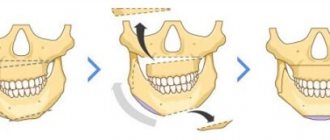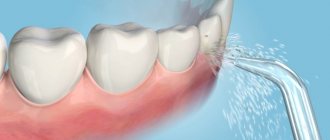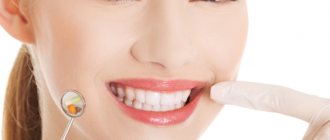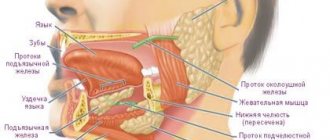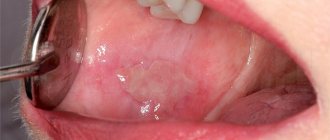A foreign taste in the mouth not only causes discomfort and prevents you from enjoying your favorite food, but also often indicates health problems.
The occurrence of a metallic taste in the mouth is familiar to a large number of people: this sensation is not the most pleasant, but not all of those who have encountered it try to find out its cause. There is nothing wrong with if the iron taste in the mouth appears once, but if it occurs periodically, then the reasons for this phenomenon should be found out.
Quite often you can hear complaints about a metallic taste in the mouth: why does it appear and how to get rid of it?
The reasons that cause an iron taste in the mouth can be very different: when faced with this symptom, you need to try to determine how often it occurs, and whether it is accompanied by any other signs.
First of all, it is worth clarifying what a metallic taste in the mouth is: it is unlikely to confuse this phenomenon with anything else, since it is a pronounced bitter taste with sour notes - a fairly accurate understanding of this taste can be obtained by touching the battery with your tongue . Often the appearance of such a taste is accompanied by an astringent sensation in the mouth and tingling of the tongue (partial numbness is also possible).
The mechanism of the appearance of taste sensations
It is not always easy for even doctors to determine the cause of the taste in the mouth.
Special receptors, mostly located on the papillae of the tongue, are responsible for the sensation of taste in humans. A few receptors are located on the palate and back of the pharynx. All of them are sensitive to several dozen different tastes and their combinations.
Taste sensitivity, like an ear for music, is individual for each person; it can be developed and improved, achieving the ideal taste, like tasters or sommeliers. Despite individual differences, the sensation of the five basic tastes: salty, sweet, sour, bitter, and the taste of meat products is accessible to absolutely everyone.
When a product hits the taste buds, the sensations they receive travel through nerve fibers to the brain. A full sensation and perception of taste is impossible without its combination with smell.
When abnormal sensations such as a metallic taste appear, occurring suddenly, without any apparent connection or cause, it is necessary to find out the etiology of this symptom in order to correct your condition, especially if such sensations occur regularly.
Diagnostics
In order to determine the cause of sour taste in men , it is necessary to undergo a comprehensive examination, which will exclude or confirm certain diseases. Comprehensive diagnostics includes the following activities:
- esophagogastroduodenoscopy (most informative for diagnosing gastric ulcers ;
- gastric pH-metry;
- ultrasound examination of the abdominal organs, including the liver and gallbladder;
- ultrasound examination of the pancreas;
- biochemical blood test, including liver tests and assessment of pancreatic enzyme levels;
- general clinical blood test;
- assessing blood glucose levels;
- consultation with a neurologist, endocrinologist, gastroenterologist, hepatologist;
- analysis for glycosylated hemoglobin.
External factors causing a metallic taste in the mouth
These reasons may be associated both with the influence of external factors and with physiological changes in the body. For example, metal can be felt when drinking certain brands of mineral water enriched with iron ions. Iron can reach your taste buds through untreated tap water passing through worn and rusty pipes. The solution in this situation is to use a high-quality cleaning filter.
The use of aluminum pots and cast iron cauldrons and frying pans may cause a metallic taste to be added to the traditional taste of food, especially if sour foods were cooked in it. In this case, the metal of the kitchen utensil reacts with food acids, salts are formed, and this is what is felt by the one who tastes this food.
Metal crowns can also cause a metallic taste, especially if they were installed a long time ago. Acidic foods can react with the metal ions in your dentures, creating a faint but very unpleasant taste.
Physiological conditions as a cause of metallic taste
Piercing as a cause of metallic taste in the mouth
If you do not pay enough attention to oral hygiene, you can soon experience this unpleasant symptom. Tartar, bleeding gums, periodontitis, plaque on the teeth and tongue - all these problems affect the appearance of distorted taste sensations.
The use of high-quality toothpaste and mouth rinse, the use of dental floss, and timely sanitation of teeth and gums can eliminate this problem. Hormonal changes in a woman’s life are certainly reflected in changes in the chemical composition of certain environments in her body.
In particular, menopause, pregnancy, and lactation change some positions of the blood formula. This is why sometimes a metallic taste appears in the mouth of women, especially often during pregnancy. Working in hazardous industries, accidents involving exposure to chemical compounds, and unfavorable environmental conditions can cause poisoning, one of the symptoms of which is the taste of metal in the mouth. Mercury, zinc, lead, copper, and arsenic are especially dangerous in this regard.
If poisoning with these chemicals occurs, then the metallic taste is accompanied by symptoms such as:
- Intense thirst.
- Continuous headache.
- Confusion.
- Nausea and vomiting.
- Dizziness.
- Pain in the abdomen and muscles throughout the body.
Without seeking medical help, a person with similar symptoms of poisoning may die or become disabled. A condition that is not as dangerous, but still very unpleasant and also accompanied by a metallic taste in the mouth, can be anemia, or iron deficiency. You can find out about its presence by donating blood for hemoglobin. Anemia can manifest itself with the following symptoms:
- Loss of strength, drowsiness.
- Headaches and dizziness.
- Dry skin, hair, brittle nails.
- Pale skin.
- Cardiopalmus.
- Cracks, or “jams” in the corners of the lips.
- Dry mouth, taste disturbances.
Although there is not enough iron in the body in this condition, it is its taste that becomes a frequent companion to anemia. It can be caused by an unbalanced diet, an increased need for iron compounds during pregnancy and lactation, and rapid growth of children and adolescents.
In addition to iron deficiency, the same reasons can lead to hypovitaminosis - a lack of individual vitamins or their groups. And just as with anemia, the taste of metal in the mouth can be a companion to this condition. Hypovitaminosis may cause irritability, drowsiness or insomnia, and decreased physical and intellectual potential. Taking vitamin complexes and enriching your diet with healthy foods will solve this problem.
Content:
- The main causes of the smell of acetone from the mouth 1.1. Hunger 1.2. Alcohol poisoning 1.3. Physical fatigue 1.4. Acetonemic syndrome 1.5. Gestation period 1.6. Diabetes mellitus 1.7. Ketoacidosis 1.8. Thyrotoxicosis 1.9. Liver diseases 1.10. Kidney diseases 1.11. Schizophrenia
- Other causes of the problem
- Diagnostic measures
If your breath smells like acetone (dimethyl ketone), you should think about your health. This is a dangerous symptom that occurs in a variety of diseases. Normally, the acetone smell should not come from a person. Therefore, it is important to identify why it appeared and what can be done to get rid of it.
Metallic taste is a symptom of disease
A metallic taste in the mouth is a reason to see a doctor.
Diseases of the gastrointestinal tract, in addition to specific symptoms at the location of the pathology, are often accompanied by the appearance of various tastes in the mouth, and a metallic taste is no exception. Most often it accompanies the following diseases:
Clinical researches
The effectiveness of various ASEPTA mouth rinses has been repeatedly proven clinically.
For example, it has been clinically proven that the two-component mouth rinse ASEPTA ACTIVE more effectively combats the causes of inflammation and bleeding compared to single-component rinses - it reduces inflammation by 41% and reduces bleeding gums by 43%.
Sources:
- The role of anti-inflammatory rinse in the treatment of periodontal diseases (L.Yu. Orekhova, A.A. Leontyev, S.B. Ulitovsky) L.Yu. OREKHOVA, Doctor of Medical Sciences, Prof., Head of Department; A.A. LEONTIEV, dentist; S.B. ULITOVSKY, Doctor of Medical Sciences, Prof. Department of Therapeutic Dentistry of St. Petersburg State Medical University named after. acad. I. P. Pavlova
- The effectiveness of the use of Asept “adhesive balm” and Asept “gel with propolis” in the treatment of chronic generalized periodontitis and gingivitis in the acute stage (Municipal Dental Clinic No. 4, Bryansk, Kaminskaya T. M. Head of the therapeutic department Kaminskaya Tatyana Mikhailovna MUZ City Dental Clinic No. 4, Bryansk
- The effectiveness of complex therapy in the treatment of periodontal diseases. (Department of Periodontology of the SF State Budgetary Educational Institution of Higher Professional Education MGMSUIM.A.I. Evdokimova. Moscow.) Nemeryuk D.A. - Associate Professor, Candidate of Medical Sciences, Dikinova B.S. - Postgraduate Student of the Department of Periodontology of the SF Tsargasova M.O. - Postgraduate Student of the Department periodontology SF Yashkova V.V. - postgraduate student of the Department of Periodontology of the SF Department of Periodontology of the SF State Budgetary Educational Institution of Higher Professional Education MGMSUIM.A.I.Evdokimova. Moscow
Side effects of medications that affect the appearance of foreign taste
A metallic taste in the mouth may occur while taking medications.
When using a number of medications, a metallic taste may accompany their use, being a side effect of the medications. These are the following groups of drugs:
- Medicines to lower cholesterol levels.
- Medicines used to treat gout.
- Antidiabetic drugs.
- Medicines for the treatment of asthma.
- Antidiabetic drugs.
- Antibiotics.
- Corticosteroids.
- Antihistamines.
- Antifungal drugs.
- Antihistamines.
- Medicines to regulate blood pressure.
In most cases, this taste will cease to be felt with the end of drug therapy, however, this side effect of the drug should be reported to the attending physician.
Treatment
Drug therapy, regimen, course, and duration of treatment are selected individually in each specific case. The choice of treatment methods depends on the root cause, age, and general physiological condition of the person.
Patients may be prescribed:
- enzyme agents;
- symptomatic medications;
- immunomodulators;
- hepatoprotectors;
- antibacterial, antiparasitic complex drugs;
- diuretics, hormones;
- anti-inflammatory drugs.
If bad breath is caused by acute or chronic pathologies or diseases, much attention is paid to symptomatic therapy and complex treatment.
Aerosols that suppress the development of pathogenic flora and special antiseptic solutions will help:
- Stopagin. A complex drug with a pronounced antiparasitic and antibacterial effect. Prescribed for rinsing.
- Chlorhexidine. Has an aseptic, bactericidal effect. Used to treat pathologies of the urinary system.
- Hexoral. An effective remedy for the treatment of dental diseases.
If endocrine disorders are diagnosed, treatment therapy is carried out under the supervision of the attending physician. Drugs are prescribed to suppress the activity of the thyroid gland, normalize its functioning, and secretory activity. For thyrotoxicosis, radioactive iodine is used.
For renal diseases, drug therapy depends on the form and stage of the underlying disease. Diuretics, anti-inflammatory, and antibacterial agents with complex effects may be prescribed, the action of which is aimed at relieving the clinical symptoms of the disease.
If uremic stench is provoked by strict diets, prolonged fasting, unbalanced nutrition, the attending physician or nutritionist will adjust the diet and prescribe a special diet to normalize metabolic processes and water and electrolyte balance in the body.
How to get rid of the problem
If the cause of this is not a symptom of a disease, or a change in physiological state, you can try to eliminate the problem by rinsing with a salt solution (a teaspoon per half liter of water), drinking fruit and vegetable juices. You can chew propolis, ginger root, fresh mint leaves, and add dried spices to drinks.
Brushing your teeth after every meal, using rinses, dental floss for additional cleaning of interdental spaces, brushing your tongue with a special brush - all these measures will help get rid of the unpleasant taste in your mouth. Timely installation and replacement of dentures and dental sanitation can solve the problem.
Prevention
Regardless of the age of the patient, every pathological tooth must be treated. The following preventive measures will help prevent the disease:
- Regular visits to the dentist.
- Timely treatment of internal systems and organs.
- Careful oral hygiene.
- Eat well, drink plenty of fluids.
- The presence of fruits and vegetables in the menu.
- Cleaning the tongue with a special brush.
- Using a humidifier.
The main component of success is a healthy lifestyle.

